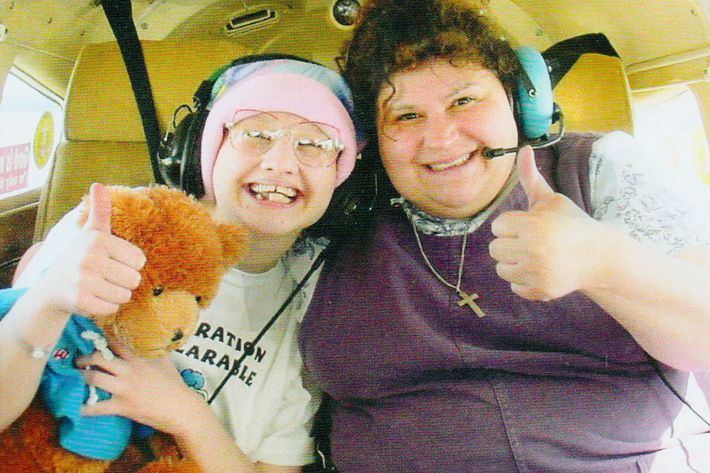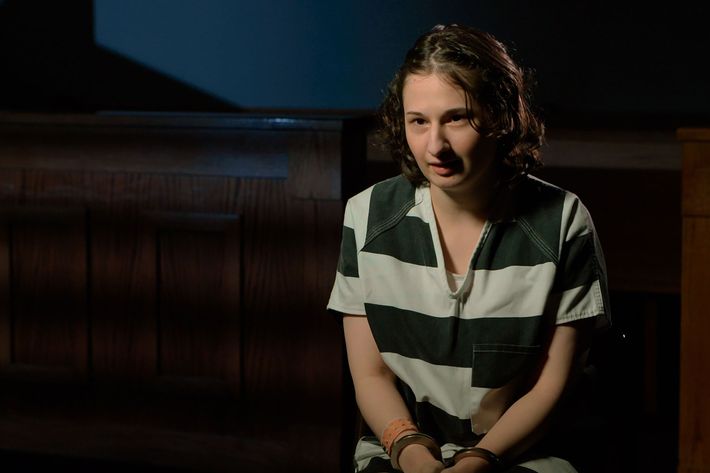
Almost immediately after Dee Dee Blanchard gave birth to Gypsy Rose, she began telling friends and family about her daughter’s dangerous and extreme health issues. As a young child, Gypsy was diagnosed with leukemia, various muscular disorders, and mental impairment; soon, she was confined to a wheelchair. Her plight inspired the generosity of friends and strangers, a devoted social-media following, and admiration for Dee Dee’s selfless devotion.
So on June 14, 2015, when Dee Dee was found stabbed to death with Gypsy missing from their home, there was an immediate outpouring of concern. Nobody could have guessed that when Gypsy was discovered a few days later, she’d be in hiding with the man who’d brutally killed her mother, and that she’d walk into the police station on her own two feet.
What she told the police was shocking: For more than 20 years, Dee Dee had made Gypsy the focus of her Munchausen syndrome by proxy, a psychiatric disorder that compelled Dee Dee to fabricate, exaggerate, and even cause her daughter’s many illnesses. Gypsy had escaped the only way she was able — through the internet. In chat rooms she met Nicholas Godejohn, an autistic man in his 20s, and the two hatched a plan to rescue Gypsy from her own mother.
The documentary Mommy Dead and Dearest premieres on HBO on May 15 and is directed by Erin Lee Carr, whose first film, Thought Crimes, was an investigation into the case of “Cannibal Cop” Gilberto Valle. She’s currently at work on a memoir exploring her relationship with her father, the late New York Times reporter David Carr. I spoke with Carr about Gypsy’s story and the making of her film.
How did you first get into contact with Gypsy?
I sent her a letter, I believe, in September 2015 and got a response back. I was in my apartment in Brooklyn and I remember getting this prison letter. There was this very kiddish scrawl that said, “Ms. Erin Lee Carr.” I said, “Okay.” Opened it. She said, “I would love to talk with you. I’m going to talk with my lawyer and see what’s possible.” She signed her name with a rose.
Having spoken to her numerous times, how do you think Gypsy feels about her mother now?
She still loves her mom. Days that she feels really conflicted is her mom’s birthday and Mother’s Day. This film is premiering the day after Mother’s Day — I think that is a weird timing thing for her. For a really big portion of her life, they were best friends. They were identical. They were together all the time. Her mom was sweet to her, loving, taking “care” of her. Then, as she started to try to gain any sort of semblance of independence — talking with a friend, having her own cell phone — her mom just completely and utterly changed into an abusive figure. The levels of complication … The way I talked to her about it, I have a very toxic relationship with my mother. We haven’t seen each other in 15 years; she’s out of prison; she lives in Arizona. I said [to Gypsy], “This is not just you. I know that I can’t empathize, I don’t know what you went through, but you are not alone in having complicated feelings about your parents and I’m here to talk with you about that.”

Do you have an opinion on whether Gypsy should be in prison or not?
I do not think she should be in prison. No, I don’t. I wish she had made different choices. I wish she’d tried to run away, but I envision her as a hostage for years in a house under the threat of physical or emotional violence, only watching Disney films, being kept alone in a room … She was handicapped inside her body. None of us, and especially the criminal-justice system, can’t begin to understand. How do decisions get made after you have a life like that? I 100 percent do not think she should be in prison.
Nick [Godejohn], as you see in the movie, as you see in the interrogation tapes, is severely mentally ill. He has Asperger’s, but that’s not what we’re talking about here. He basically doesn’t know how to exist in this world, how to communicate. He was never able to hold down a job. His version of reality is also different than ours. I think if anybody in … I think if she had met 99 other people and she said, “I’m being physically abused by my mother. I’m being trapped in a wheelchair. I need your help,” they would say, “Okay, I’m going to come pick you up. I’ll do X, Y and Z.” No one would have murdered her mom. It was just this crazy, completely bizarre thing that led her to Nick.
Do you think anybody else would have believed what was going on with her?
I think Dee Dee, as I hope that we portrayed her, was incredibly gifted with her ability to confuse, to manipulate, to portray herself in a certain way. I think Dee Dee was a phenomenal actor … I talked to a lot of neighbors who would not go on the record who said she was one of the hardest-working mamas around here. She was always with her kid. She was always going to church or going to Harry Potter, going to the movies or going to the doctor’s again and again and again. I think that it all comes down to Dee Dee and her intent to show this little girl, but this actual woman, to be handicapped.
[But] when you’re in social services you are taught to notice signs of abuse. I think that it might have been hard for friends and family to see the abuse that was going on, but if you’re a trained professional, if you’re a doctor, if you’re a social worker … DYFS [Division of Youth and Family Services] was called on the house. They did a home visit. Police officers had been to the house. Those are people that should have seen. When we talk about cracks in the system, it’s everybody. Everybody is complicit in this.

Can you talk about the role of sexuality in this case?
It was this very natural progression of becoming older, where she started to consider her own sexuality. Like Michelle Dean says so smartly in the film, that’s what broke this open. That’s what started all of this. I find that it was really important for me to include the conversation of sexuality because this whole movie, she’s completely been infantilized. She has bows on her head. She looks like she’s 12. She’s not. She’s in her late teens, early 20s, and she’s figuring out who she is. There’s pictures of her that are in sexual poses that we really grappled with whether or not to include.
She didn’t know how to kiss. One of the most human behaviors that we participate in. She didn’t have access to anybody to talk to about this, so she’s going to learn on the internet. What’s going to happen when you learn things on the internet? It’s going to be extreme.
There’s a particular scene in the movie where it was always really hard for me personally. They’re in the hotel after, her and Nick, [and Gypsy is making a video on her cell phone]. She says something very sexual about him and it makes me cringe. It makes me feel so uncomfortable. It makes me feel like I did something not great, that I betrayed some sort of trust, that she never wanted anybody to see this. This was completely private. I had a discussion with Andrew Coffman [the film’s editor] and he was like, “No, this is an archival document the day after the murder that we have access to. It’s important to include.” It’s really, really, really important to work with smart people who are going to challenge you and say, “This is why I think this belongs.”
I know Gypsy is getting her GED. What else is she doing while she’s in prison?
She has more friends now. I think that when she was in Greene County Jail, you couldn’t really be friends because there would be snitches, is what she explained to me. If you talked to people about your case, then they can testify against you to alleviate their bid. She was instructed through her lawyers, through everyone, “Do not talk to anybody.” Again, she was living this incredibly isolated life. She couldn’t really talk to me about everything because she was going to trial. I think that she’s easing into life. She’s going to the rec yard. She’s making friends. She’s figuring out what her interests are. She’s reading. She has a job.
Has she seen the film?
She hasn’t seen the film. It’s so sad. The wardens would not allow her to see the film. That is the case in many of these things.
The following interview has been lightly edited and condensed for clarity.




